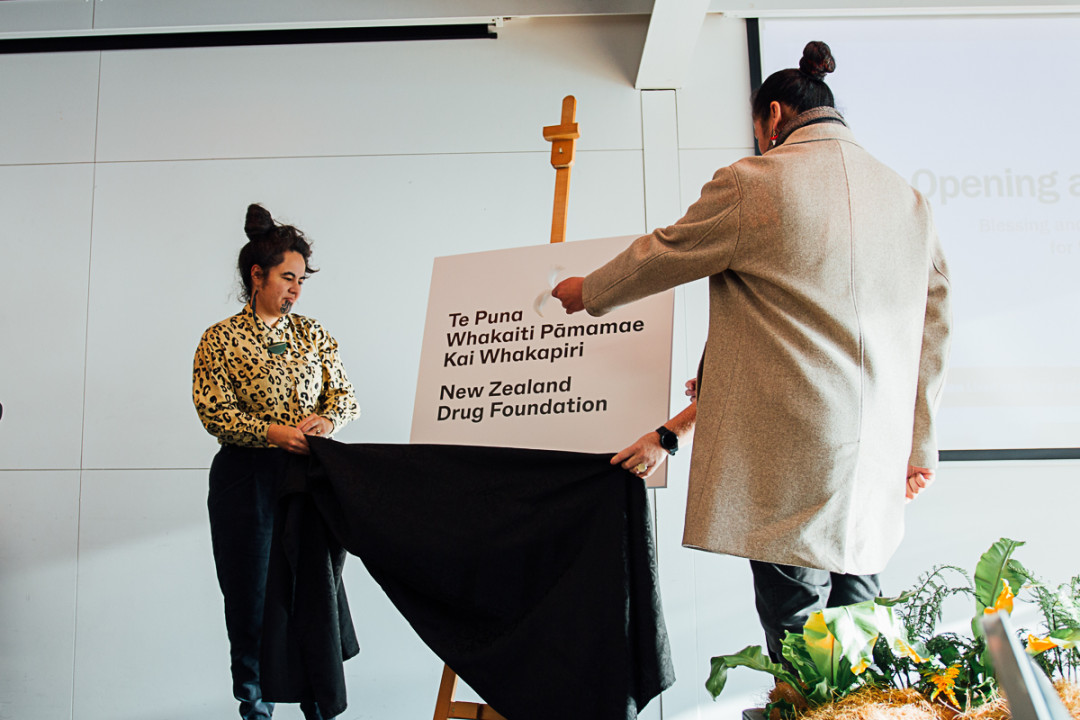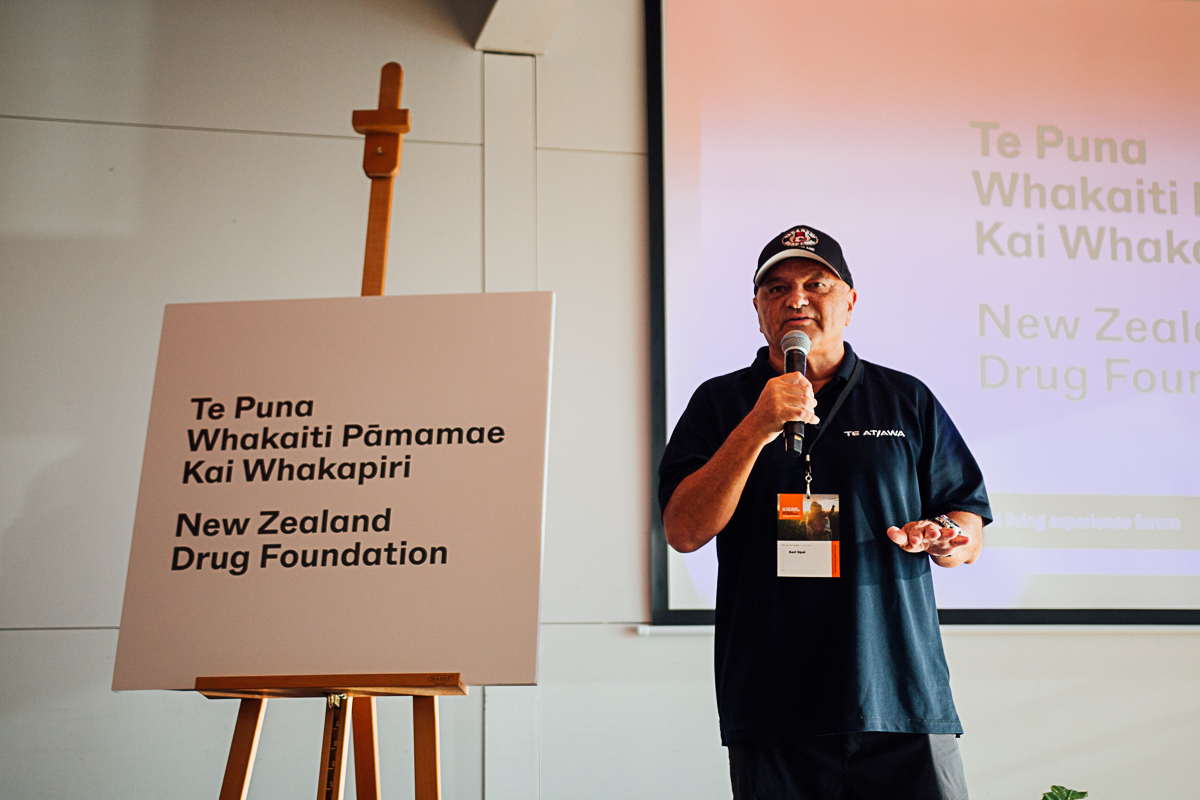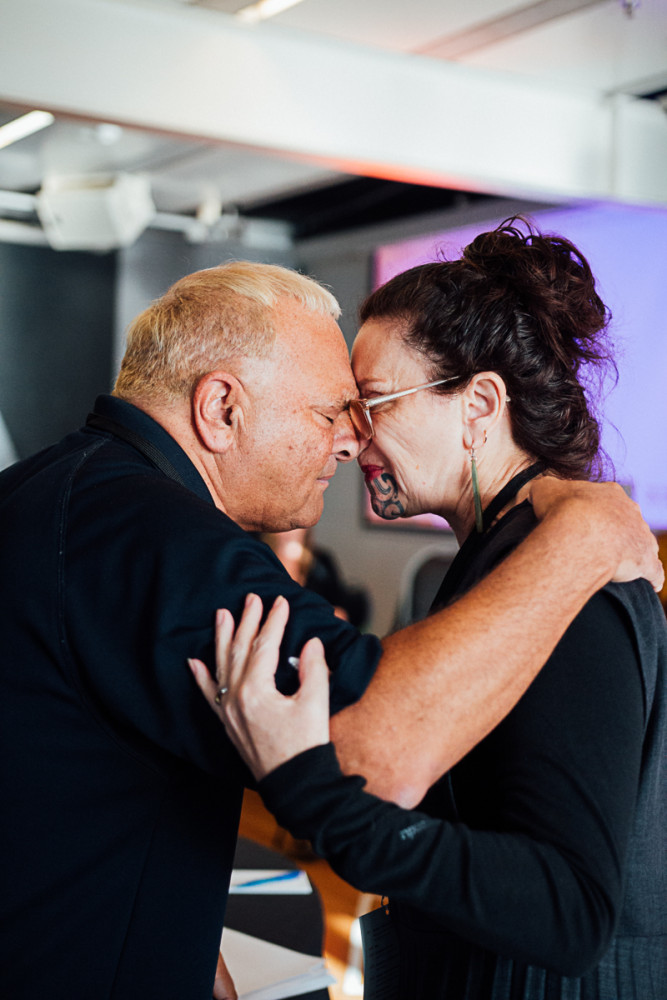‘Changing the kōrero’ - introducing our new ingoa Māori

Drug Foundation board member Julia Whaipooti and mana whenua representative Kurt Komene with the newly unveiled ingoa at the Drug Foundation's Lived and Living Experience forum.
At the start of June we held a lived and living experience forum in Te Whanganui-a-Tara, Wellington. The day was powerful and emotional, and the group of participants who’d gathered from across Aotearoa were incredibly supportive and generous. We had valuable kōrero about the health needs of tāngata whai ora and their whānau, including their experiences of dealing with the health system.
This is a group of people who know all about how shame and stigma around drug use can compound harm and stop people getting support.
So it was the perfect setting to quietly introduce and bless our new ingoa Māori (Māori name), which includes new, destimatising drug kupu (words). As the ingoa was revealed and explained, I could feel that cloud of stigma in the room lessen.
And now we want to share it with you, too. You’ll start to see our new ingoa pop up over the next few months as we launch a new website and refresh our resources. And hopefully you’ll find a chance to use the new kupu yourself, too.
Te Puna Whakaiti Pāmamae Kai Whakapiri
In its entirety, our new ingoa describes our mission of working towards an Aotearoa without drug harm.
The ingoa was developed by expert linguist Keri Opai (Te Atiawa, Ngāti Ruanui, Waiohua, Ngāti Te Ata, Ngāti Porou). Keri is an educator and author known for many things, including his best-selling book Tikanga and his work developing new, destigmatising kupu Māori for mental health and diagnoses such as ADHD and autism.
Te puna is a well-spring.
A metaphorical description of what the Foundation is, as a resource, catalyst, support, policy shop, developer of new interventions, champion, a partner and enabler of others, and problem-solver. A go-to source.
Whakaiti pāmamae is to reduce harm.
Whakaiti literally means to ‘make small’. Pāmamae is harm. This term describes what the Foundation does across our communications, policy, and programmes of work.
Māori have long worked to use strategies to manage harms, using things like tohunga practices, rāhui and whānau support. Keri gifts this new phrase to the Foundation, the AoD sector and Māori health providers to help us create a term that describes harm reduction in a way that is appropriate for Māori.
Kai whakapiri is a newly created generic term for drugs.
While there are names of individual drugs (like tio whakaihi for methamphetamine) there is not a generic term, except for a stigmatising word ‘whakapōauau’, meaning “thing to make one confused”.
Stigma and discrimination have long had a major role in compounding drug harm, preventing people from seeking help. Therefore, it was important for Keri and the Foundation to find a term that would tackle this.
Kai whakapiri reframes the term ‘drug’ from the stigma and discrimination that comes with addiction and drug use and instead associates it with the human need of seeking connection.
Māori have had more than our fair share of disconnection: from our reo, our whenua, our whakapapa, our culture. For some, from whānau. For those who have worked in, or been through, addiction treatment, they report a recurring story of disconnection.
Both Pākehā and Māori have used substances to help them connect, the most common one being alcohol. We aren’t endorsing that, but we also don’t judge it.
The term secondarily suggests a social aspect associated with drug and substance use.
Some kai whakapiri have a rongoā or health benefits that are becoming more widely understood, such as medicinal cannabis or psychedelics, connecting those who use them to, and restoring, their tinana and enabling participation in whānau and society.
At the launch of the ingoa, Keri told the forum he wanted the new kupu to “change the kōrero and change the narrative about drugs.”

Keri Opai - Keri Opai explains how he developed the new ingoa.
“I had access to real experts in this area,” he said. “And it was all about wanting connection. It’s just a human trait. Everyone wants connection and sometimes we find that with drugs or whatever else.”
“So it’s actually kai whakapiri. It is kai, you consume it in some way, shape or form. And whakapiri: to want to adhere to something, to cling to something, to connect with something.”
The new ingoa Māori will sit alongside the NZ Drug Foundation’s English name, replacing our existing reo name ‘Te Tūāpapa Tarukino o Aotearoa’.
We highly encourage people to use the terms whakaiti pāmamae for harm reduction and kai whakapiri for drugs, however when the name Te Puna Whakaiti Pāmamae Kai Whakapiri is used, it should be used in full and not abbreviated, out of respect for te reo Māori.

Keri Opai and Tracey Potiki - Keri Opai and Tracey Potiki (Kaiwhakahaere, Whare Tukutuku) after the launch.
Recent news

Beyond the bottle: Paddy, Guyon, and Lotta on life after alcohol
Well-known NZers share what it's like to live without alcohol in a culture that celebrates it at every turn

Funding boost and significant shift needed for health-based approach to drugs
A new paper sets out the Drug Foundation's vision for a health-based approach to drug harm

Expert Pharmac committee recommends funding for overdose reversal nasal spray
The expert committee has said funding for naloxone in the community should be a high priority

